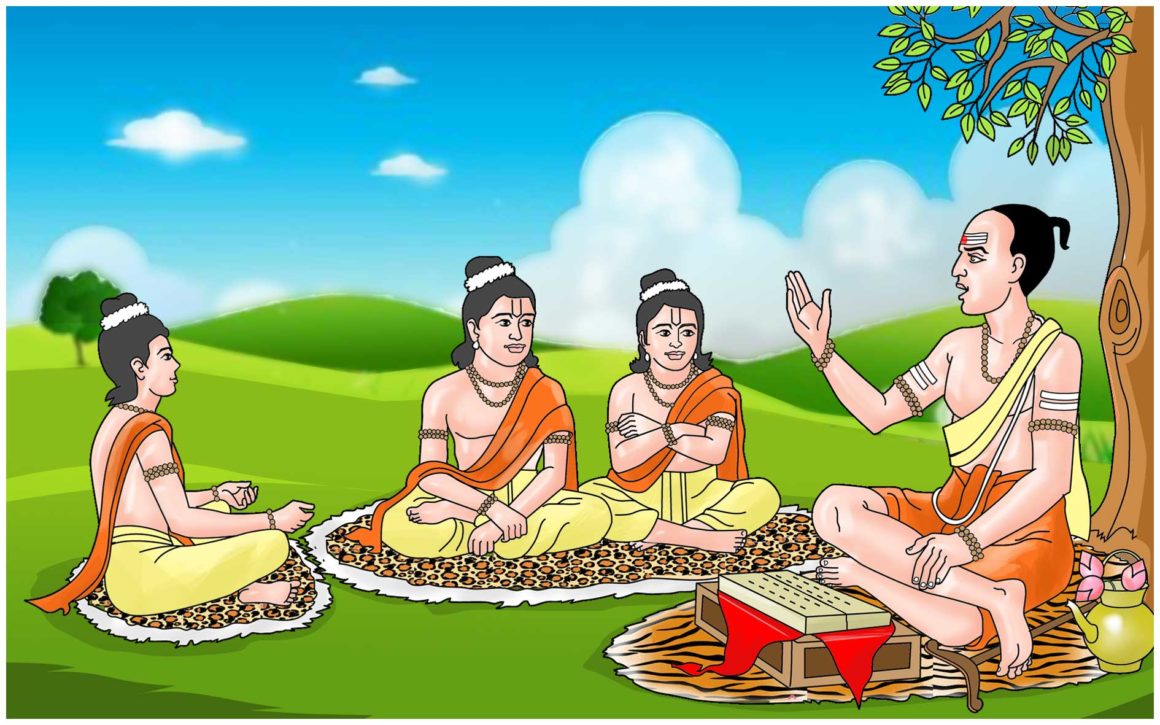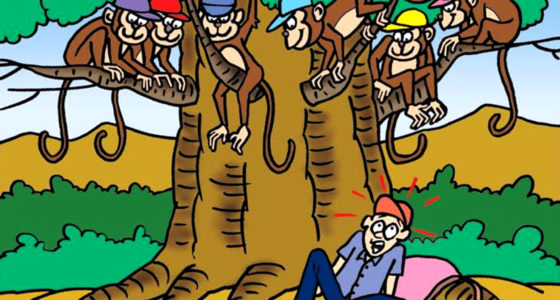September 5th is observed as Teachers’ Day in India. It is the birthday of Dr S. Radhakrishnan, a former President of India, who had taught university students in different parts of the country. On Teachers’ Day, Katha Kids presents the story of the greatest teacher of all time — Vishnu Sharma, the author of Panchatantra.
A king in ancient India had four sons. They were playful. They loved to have fun, but showed no interest in studies. At first, the king thought his teachers were incompetent and he invited new teachers. But the princes made no progress. They could not even read the alphabet.
The king was now worried. A prince today is a king tomorrow. Ruling a kingdom is no child’s play. A king needs to take quick and right decisions. This is possible only if the King is a wise and learned man. That’s why the King wanted his sons to be educated. So, he went on changing teachers with no result whatsoever. He lost all hopes of seeing his sons educated.
One day, a teacher approached him. His name was Vishnu Sharma. He told the King that he would make his sons learned and wise in six months. The King was unsure, but Vishnu Sharma had made a bold claim. Therefore, he employed Vishnu Sharma to tutor the boys.
Vishnu Sharma took the princes to his cottage, on the bank of a river at the outskirts of the capital. “Let me tell you a story,” said the teacher. The princes were surprised to hear this. All the teachers so far would begin with grammar and arithmetic. This man wanted to begin with a story!
The four boys sat near their teacher to listen to the story.
Vishnu Sharma was a gifted story teller. This is the first story he narrated:
A rich merchant from the south wanted to earn more money. “People respect those who have money. The more money you have, the more respectful they are,” he thought. He loaded his wares in a train of bullock carts and left for Mathura, a city in the north.
The caravan of bullock carts covered the long distance without any difficulty. Then they entered a forest on the bank of the Yamuna. Once they crossed the forest, they would enter Mathura.
As they neared the river, one of the bullocks stumbled, fell and broke his leg. The animal was in pain and could not walk. The merchant quickly unyoked the bullock and offered it some water. It was clear that the bullock would take many days to recover. But would it be wise to remain with the bull in the dangerous jungle where wild animals roam free? An elderly companion advised the merchant to leave the bullock in the forest and move on. “To safeguard greater interest, a wise man would sacrifice smaller ones,” said the elderly companion.
The merchant abandoned the bullock in the forest and resumed his journey.
The poor animal was left alone. He could hardly move. He was an easy prey for any wild animal passing by.
But luck was on his side. No wild animals came to his side of the forest. The cool breeze lessened his pain. He started eating the fresh green grass around him. Gradually he regained strength. His leg healed and he was able to move freely. Thus, roaming freely in the grassland, drinking the pure water of the Yamuna, breathing the clean air, eating fresh green grass, the bullock grew fat and strong. Elated, he opened his mouth and bellowed loudly.
So loud was the sound he made that it startled the lion, the king of the forest. The lion was on his way to the river with his friends. But he gave up the idea of quenching his thirst, and turned back heading to a safer place. When he found one, he sat under a tree, still shaking with fear of the new entrant to the forest.
When the lion sat, his friends also sat. Two jackals who were out of favour with the King, also sat, at a distance. One of the jackals wondered why their king abruptly abandoned the idea of quenching his thirst — and why was he looking so scared.
The other jackal told him sternly it was none of his business to worry about their king. “When you poke your nose, you will end up like the foolish monkey who meddled with a wedge stuck in the log of wood.”
The first jackal got curious about the monkey now. He asked the other jackal to tell him what happened to the monkey.
So the jackal began narrating the story of the foolish monkey.
At this stage, Vishnu Sharma announced a break for lunch. The princes were so engrossed in the story that they begged their teacher to continue. With a smile, Vishnu Sharma continued the story.
Thus, Vishnu Sharma weaved a story within a story and it took many days and many stories, before he could come back to the main story of the lion, which was frightened by the roar of a bullock. The boys listened to the stories with rapt attention. They discussed the stories in detail, and in the process, they understood how people behave in this world — their ambitions, hard work, foolishness, cunning, deceit, smartness to counter deceit, and so on.
After six months, the boys had learnt everything about human nature, and how they could tackle various problems as kings.
When Vishnu Sharma took the boys back to the King, the latter could see the change in his sons. They fell at his feet and spoke politely.
The eldest of the princes spoke, “We are grateful to our teacher for opening our eyes. We are now prepared to shoulder the responsibility of the administration.”
The second son added, “We want to put into practice what we learnt from our teacher.”
“What did he do? What books did he use?” asked the King.
“Life is the best school, that’s what our teacher taught us,” said the third prince.
“But how did he teach you without books?” King asked.
“He told us stories,” said the fourth prince.
In the days that followed, the King saw how the princes handled difficult situations. They were fearless. They were wise. They took quick decisions. They took the right decisions.
The king marvelled at the teacher who taught his sons through stories.
“I wish all teachers tell stories to kids,” thought the king.






